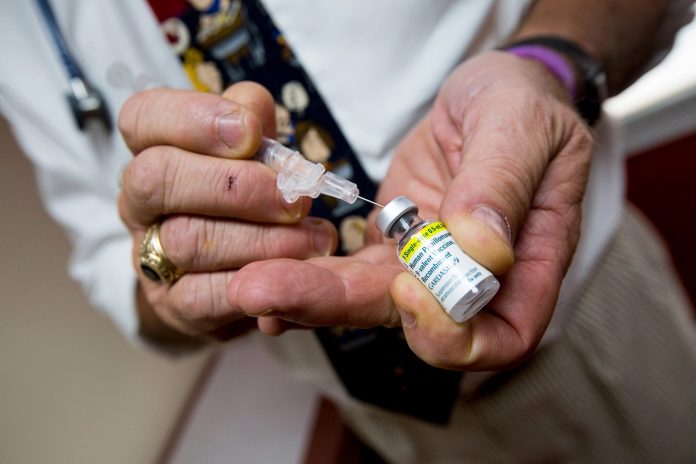For years there has been the dream of a vaccine to prevent cancers, well it is here and in some areas less than 50-percent of the young people who could receive it are not.
This “wonder drug”, the HPV vaccine, prevents the Human Papilloma Virus and when it is administered to both young male and female adolescents it offers a life time of protection from a handful of cancers. It is estimated that the cancers the HPV vaccine could prevent cause 4,000 deaths from cervical cancer in women each year and this is regardless of the fact that these illnesses were caught by early screening and treatment.
In a recent study by the Centers for Disease Control and Prevention, in Atlanta, Ga., it was found that among female youths with private health insurance an average of only 12 percent had completed the HPV vaccination series by the age of 13 while slightly more at 19 percent covered under Medicaid had completed the series. These average numbers are even worse when broken down by regions which showed that between 0 and 34 percent of those with private health plans and between 5 and 52 percent with Medicaid had completed the series.
In the words of the CDC report, ” this study indicate that there are significant opportunities for improvement as HPV vaccination coverage among female adolescents was low for both commercial and Medicaid plans”.
This for a vaccine that could greatly reduce the death rate of women from cervical cancers and men from others forms of the disease. Added to this is the fact that studies have shown that nearly all sexually active adults at some time have come in contact with the virus.
Very simply, HPV is a very common virus, with more than 150 related viruses in this group. Of this larger group, there are those that are referred to as HPV type. The virus gets its name from the type of warts some of the virus group can cause, called papillomas. But some of the HPV viruses can do much more than this and cause cancers in both men and women.
It is estimated that 79 million individuals are infected with the virus, the majority being in their teens and early 20’s. In most cases the HPV infections cause no problems and go away, but in some individuals they persist. It is these individuals that are at risk for the development of genital warts and in some cases cancers.
Variants of HPV have been directly linked to the development of certain forms of cervical and other cancers, which can include cancers of the vulva, vagina, penis or anus. HPV can also cause cancers in the back of the throat and base of the tongue and tonsils.
It is recommended that the vaccine be given to young adolescent boys and girls between the ages of 11 and 12-years-of-age. By doing so the youths are protected well before they may face exposure to the virus. The vaccine is administered in three doses, with the second being given 1 to 2 months after the first and then the third and final dose at 6 months after the first shot was given.
This simple three dose vaccine, as studies have shown, can offer lifelong protection against the illnesses caused by HPV.
For those with young adolescent children, it is important that if the health care provider does not suggest the vaccine, then the parent or guardian should be proactive in asking when their child should receive it.
Though it is best for individuals to receive the vaccine at the recommended age, for those who did not, there is still a chance to gain protection.
Women though the age of 26 can still receive the vaccine while men up to the age of 21 can do so. It is also recommended that any male 26 or younger who has sex with other men or men with compromised immune systems, which includes having HIV, receive the vaccine if they did not complete the series.
For those individuals who are receiving the vaccine for the first time and have shown positive for HPV, though the vaccine will not have any effect on the current virus they are infected with, it will protect against future exposure to other varieties of HPV.
Very simply, all research shows that this vaccine will offer protection for those who have had the full series prior to becoming infected with HPV and can offer limited protection for those already exposed.
This very simple step, if it that had it been available in the past could be saving the lives of up to 4,000 women each year who die from cervical cancers caused by HPV.








